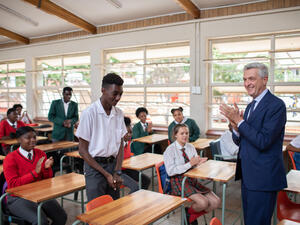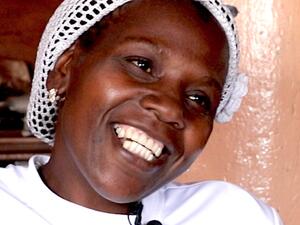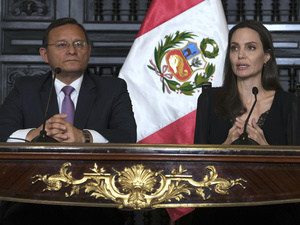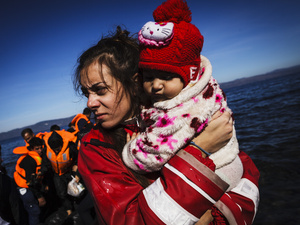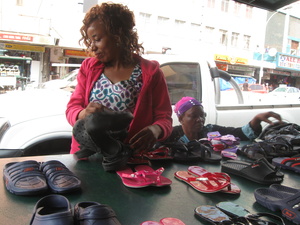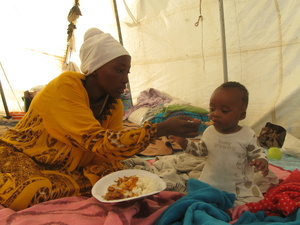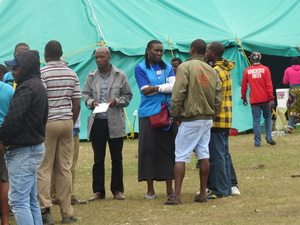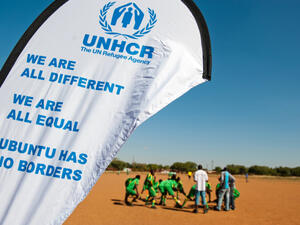Tension in South Africa as refugees and residents compete
Tension in South Africa as refugees and residents compete
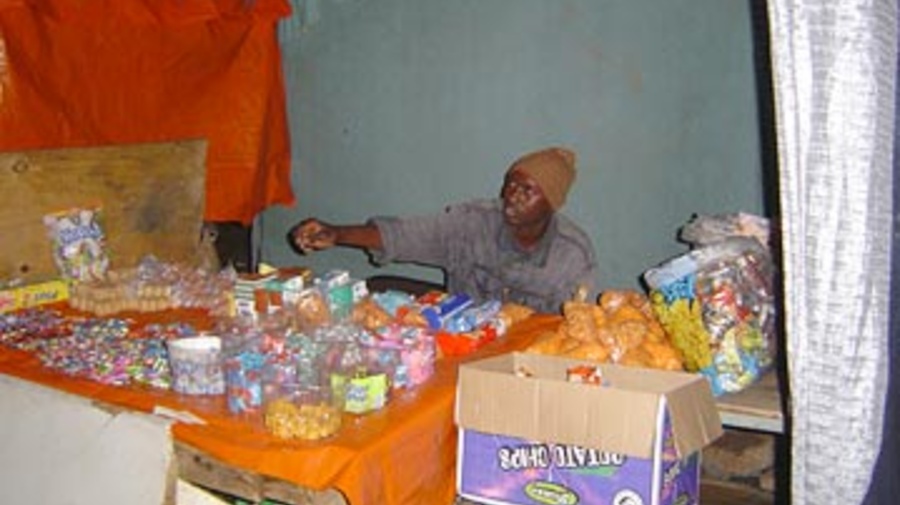
A Somali refugee makes a living by selling sundries from this small shop in South Africa. Local traders have complained about the competition from the Somalis.
DIEPSLOOT, South Africa, July 12 (UNHCR) - A few kilometres from northern Johannesburg's plush and leafy suburbs lies the sprawling settlement of Diepsloot, where dwellings are haphazardly assembled from corrugated iron.
With a population of about 150,000, Diepsloot is a microcosm of South Africa's poorest of the poor. It is dotted with tiny stores, known as tuck shops, and ramshackle vegetable stands largely owned by its South African residents. Next to these stand sizeable retail outlets owned and run by Somali refugee traders.
With poverty, scarce resources and high unemployment, stiff competition from Somali traders has triggered rising tension and violence between local business people and Somali refugees and asylum seekers. It is a confrontation that fuels xenophobia and has become too familiar throughout South Africa.
Local traders recently approached the Diepsloot Business Management Forum (DBMF), which has regulated business practices in the community for nearly 10 years. They claimed Somali refugees were destroying their livelihoods.
"We are under attack from these people," an irate trader and DBMF member said. "For example, I have my tuck shop in a certain place - then a Somali places the same business right next to mine. On top of that he sells his goods so cheaply, all my customers end up deserting me! How am I expected to survive?"
Sentiments like this prompted local business people to ask the DBMF to expel Somali traders, irrespective of the legality. Written ultimatums to leave Diepsloot by last June 26 were served on the Somalis. One Somali was attacked and forced to close his shop - other Somalis fear they may be next.
A founding member of the DBMF justified the orders by saying their constitution stated that all business dealings in Diepsloot were meant to benefit the disadvantaged South Africans living there. He said there were now 19 Somali-owned stores and many locals had been forced to close shop.
The conflict is not unique to Diepsloot. In 2001, Somali refugees living in the KwaNobuhle Township in Eastern Cape Province were forced from their homes. Their businesses were vandalised and looted because, according to the local community, they obtained stock from inferior sources and so charged lower prices. Local traders shut because they could not compete.
In 2005, the Eastern Cape resort towns of Plettenberg Bay and Knysna reported violence against Somali refugee traders. Similar targeting of Somali traders has been reported in small towns in Free State and North West provinces.
As has happened in other confrontations, local councillors, UNHCR and its legal and social counselling partners, the South African police, representatives of Somali traders and members of the DBMF convened a meeting to resolve the standoff between local and Somali refugee traders.
In other instances, UNHCR has sent fact-finding missions to find ways to tackle the problem. Acting with government institutions such as the Department of Home Affairs, the South African Human Rights Commission, municipal managers, law enforcement officials and refugees themselves, UNHCR and its partners have found overwhelming support.
In conjunction with this, Roll Back Xenophobia, a UNHCR-funded advocacy body, in partnership with government and non-governmental stakeholders, is about to embark on a campaign to sensitise local communities and refugees to their mutual rights and obligations. South Africa, with a population of more than 44 million, has about 30,000 refugees and some 100,000 asylum seekers.
While many DBMF members concede their rivals are just exercising their economic rights under South African law, they object to the way their isolated communities outside the major cities face stiff competition from Somali refugees.
Mohamed Ali, a Somali representative, told the DBMF meeting that he and his counterparts were willing to share their skills with local businessmen. They would go as far as negotiating the pricing of goods with the locals, he said, while noting that he had a right to reside where he chooses in South Africa.
At this point a flurry of questions and comments, ranging from threats of physical harm to queries on how Somali traders price goods so cheaply, forced the local ward councillor chairing the meeting to call for order. A calmer member of the DBMF said the issue required more meetings. He urged fellow members to lift the ultimatum for Somalis to leave until they had talked through all the issues and investigated working with Somalis to improve their own businesses.
No one objected and the Somali refugees had been given a reprieve. This time local traders were willing to work for a solution. But UNHCR and its partners will have to continue their fight against xenophobia to ensure it does not become a growing problem.
By Pumla Rulashe in Diepsloot, South Africa


